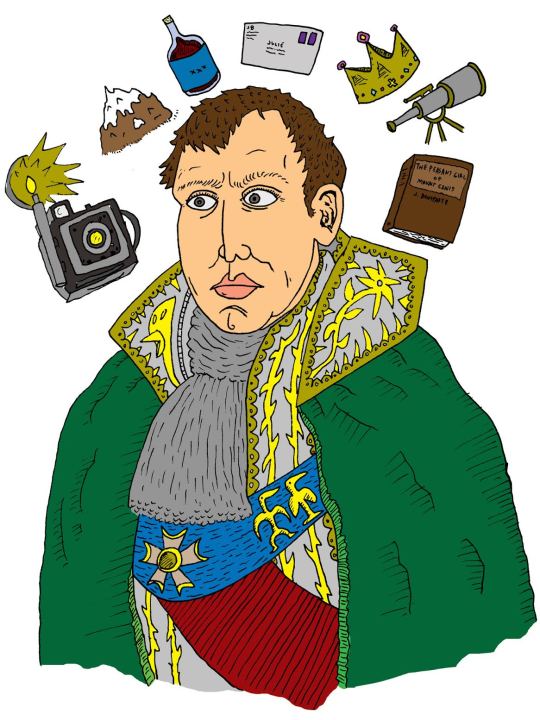
On Joseph Bonaparte: Brother to Napoleon, King of Spain, Amateur Novelist. By Brett Mead and Andrew Ridker
I. A NOVEL
April, 1815. Joseph Bonaparte is living out his retirement in Switzerland. His brother, Napoleon, has just returned from exile and once again sits on the French throne. Meanwhile a massive allied army under the Duke of Wellington sits on the Belgian frontier. One night, fearing his brother’s probable defeat, Joseph wanders out into the darkness of his estate. There among the forest and its foxholes he buries five million francs worth of jewels—insurance. He leaves for Paris the next day.
Rochefort, France, three months later. Napoleon, who has just lost the Battle of Waterloo, tells of his intention to surrender to the British. Joseph offers to impersonate him and surrender in his brother’s stead. Napoleon declines. The two part ways.
Convinced of his own impending capture, Joseph leaves his beloved wife and daughters behind, assumes an improvised name, and boards a Swedish merchant ship bound for New York.
He checks his entire party into a single room at a seedy Manhattan hotel, but word of his arrival quickly spreads. The Mayor of New York knocks at his door. A Napoleonic veteran accosts him on Broadway.
And then the media catches on. One article, reassuring readers of the ominous appearance of a Bonaparte in America, draws his character with heartbreaking accuracy: “Those intimate with him say he is unambitious; and that the parts he has performed in the raree show of Kings were imposed upon him by his brother.”
He becomes a celebrity. What else, with a name like Bonaparte? Joseph mixes easily with Philadelphia’s elite. He befriends the wealthiest man in America—Stephen Girard, a Frenchman and the prime financier of the War of 1812. With his help, Joseph purchases a huge estate in Bordentown, New Jersey, naming it “Point Breeze.” Everyone calls it “Bonaparte’s Park.”
By the spring of 1816, Joseph is back in the press. A local printer named Isaac Riley is looking to capitalize on New York’s newest celebrity. He’s in luck: Joseph’s written a novel.
II. “YON PEACEFUL STREAMS.”
On April 26, 1816, the first advertisement for Joseph Bonaparte’s book hit newsstands: “THIS DAY PUBLISHED BY I. RILEY, MOINA, or the Peasant Girl of Mount Cenis, by Joseph Bonaparte, translated from the French—Price, 50 cents.”
The novel—originally published in 1799, the year Napoleon toppled the French Directory and granted himself dictatorial powers as First Consul—had failed to make a splash in the Bonapartes’ France. Madame de Stael had a few kind words, and Bernardin de Saint Pierre was apparently flattered that it borrowed from his own novel, Paul et Virginie. But that’s about it...
You have reached your article limit
Sign up for a digital subscription and continue reading all new issues, plus our entire archives, for just $1.50/month.
Already a subscriber? Sign in




